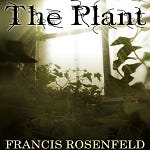Jack’s thirst for the interesting and the unusual was never quenched, and since he was so good at making stuff up he decided to put his talents to good use and become a professional liar. A fiction writer, that is. He flirted with journalism for a little bit, but after his own unpalatable experience with revelations and consequences, he decided that this field really wasn’t for him. He did some travel, learned a lot from his journeys, and a few years later, when he had the means, just to put the frustrations of his youth behind him, he bought a piece of land and planted a dome on it, which became his retreat and occasional writing studio. Of course people thought that was odd, but then again, writers get a pass on being eccentric.
The jolly librarian moved heaven and earth to start a council for ecological preservation and have the plant declared a protected species. She used up all the good will and favor she had with the city hall to designate the wild domes area a nature preserve, and got the funds to maintain and expand the zone, which had grown significantly larger over time, with the promise that revenue from the stream of tourists would benefit the city as a whole.
Diane outgrew her youthful romantic drama, went to college and became an attorney. She rented a little space downtown, quite close to the science lab, actually, and put up her shingle there. She had quite a successful practice, to the pride and joy of her parents, who never ceased bragging about it.
Stacey joined the Navy, to the shock of her friends and acquaintances, who had always pictured her as a little live Barbie. She advanced through the ranks with honors and became a rear admiral. The only qualms Tom and Carol had with a career like that was that, for obvious reasons, it took her quite far from home, but they resigned themselves to see her over the holidays and visit whenever they could. Tom liked to joke that their daughter had turned him and his wife into real globetrotters, now in their old age.
As far as he was concerned, he worked at the factory/plant habitat/petal foundry until his mid sixties when he retired from it, just as he expected, comfortable enough to enjoy his golden years with Carol and tackle a few projects he had put off over the years, for lack of time.
Little Teddy was a bit of a troublemaker all throughout school, it seems that personality reveals itself early and his endless temper tantrums weren’t just the terrible twos. His father decided to guide him towards athletics, thinking that strenuous physical effort might burn off some of that extraneous energy. Teddy wavered between sports and several other fields, started college a couple of times and then, through a weird confluence of circumstances, got to try photography and loved it. He became a traveling photojournalist and contributed to a few reputable periodicals that Carol never failed to display on the coffee table, for all the guests to see.
The malt shop owner kept tending store way past her retirement age, out of concern that whoever it was that took over from her wouldn’t have the curiosity and communication skills to keep it the hub of news and social activity in town. She finally found a young apprentice, whom she taught her craft and entrusted with the rich history of the place, and she handed him the keys to the store, her heart finally at peace.
Mr. Feldman continued teaching at Jack and Richard’s school for many decades, guiding generation after generation of children through the wonders of science and the challenges of science fairs. He ended up teaching Diane’s children, too. All three of them.
Mrs. Jenkins went on spearheading her efforts to keep reality from interfering with the way she thought life should be, and continued being an outspoken advocate for the restoration of good old fashioned values. She had a small but faithful following of devotees.
Richard went to college to study mechanical engineering. He put together a few of his old projects, together with a few theoretical studies, presented them to the scientific committee and received a research grant to develop biologically based machines. Grace to his first successful attempts, the grant became permanent, and he funneled all of his efforts into becoming one of the pioneers of this new field. Over a decade, he set up the infrastructure for a department of bio-mechanics inside the school of engineering, department which he ended up running. He never stopped advocating for the ethical treatment of bio-based mechanical composites, and he treasured as the most important accomplishment of his life the fact that he managed to convince the scientific community to qualify them as life.













Share this post